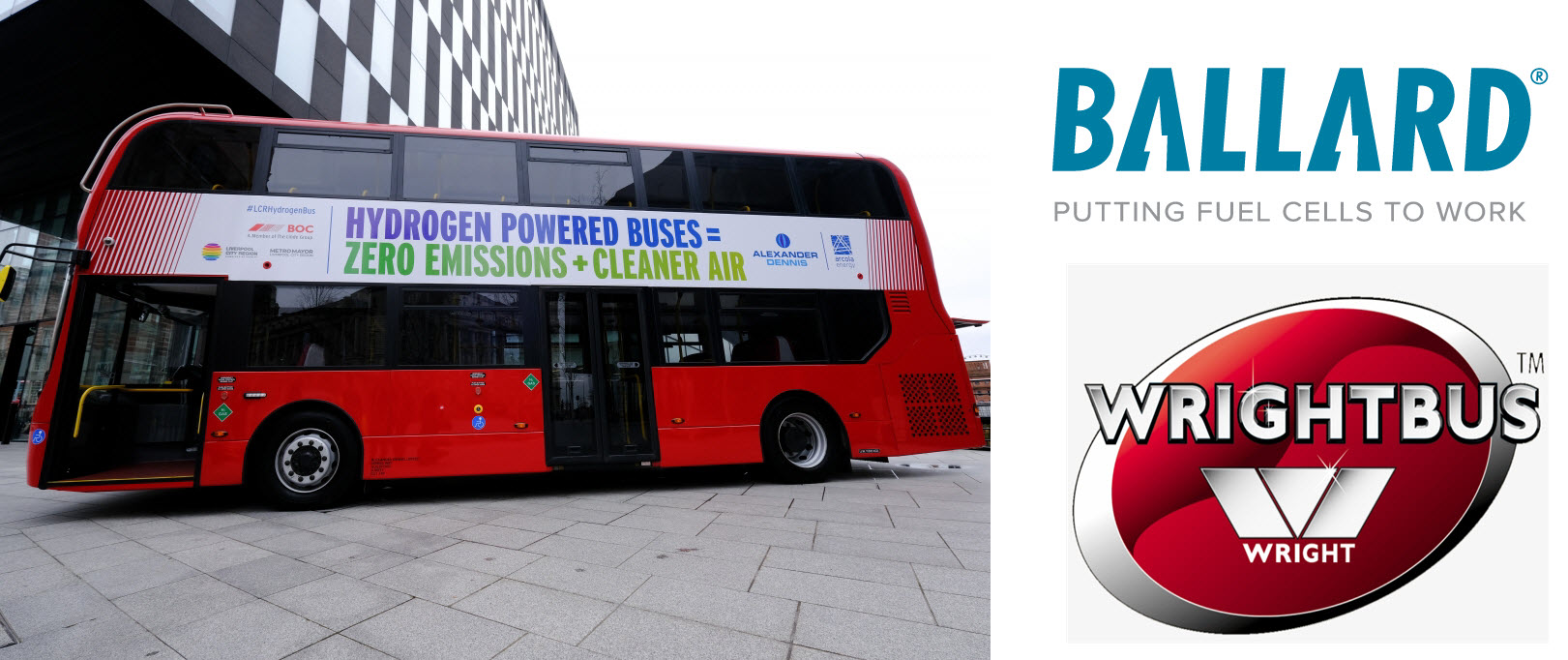
- Underscores growing momentum in Europe’s fuel cell bus
VANCOUVER, BC— Ballard Power Systems (NASDAQ: BLDP) (TSX: BLDP) today announced that it has received follow-on purchase orders for 15 of its 85-kilowatt heavy-duty FCveloCity®-HD fuel cell modules from Wrightbus (www.wrightsgroup.com), a leading bus OEM and Ballard partner headquartered in Northern Ireland, to power Fuel Cell Electric Buses, or FCEBs, planned for deployment in the U.K. Wrightbus was recently re-capitalized by Bamford Bus Company (“Bamford”), after having gone into administration last year.
Including the 15 modules announced today, Ballard currently has orders in-hand from Wrightbus for a total of 50 modules to power FCEBs in the U.K., 35 of which were previously announced in 2019. Of those 35 modules, 20 are to power buses planned for deployment in London, and 15 are for buses planned for deployment in Aberdeen. Ballard expects to ship all 50 modules in 2020.
Earlier this year the U.K. Government’s Department for Transport (DfT) announced a 5-year, £5 billion (US$6.4 billion) plan to enhance bus and bicycle infrastructure in the country, together with deployment of at least 4,000 zero-emission buses, with further details expected in a National Bus Strategy to be published later in 2020. The case for using sustainably produced hydrogen in transportation to further the U.K.’s climate and air quality objectives is presented in a June 2020 report from The Centre for Policy Studies, titled “Driving Change: How hydrogen can fuel a transport revolution”, available for download here.
Jo Bamford, Owner of Wrightbus said, “Cities around the world are seeing massive reductions in air pollution as many vehicles have been kept off the road during the pandemic. However, the reality is that if we just go back to how public transport has traditionally been run, levels of pollution will quickly rise again to the same levels as before the crisis. We have an opportunity, working with Ballard’s leading-edge technology, to build hydrogen-powered buses that will make a huge difference to air quality, as well as generating U.K. jobs. Therefore, our organization is strongly encouraging DfT to provide funding support for the deployment of 3,000 Fuel Cell Electric Buses, as part of the U.K.’s National Bus Strategy.”
Ballard, Wrightbus, and Ryse Hydrogen – also a Bamford-owned business – are founding members of the H2Bus Consortium, announced in June 2019, and focused on the deployment of at least 1,000 zero-emission Fuel Cell Electric Buses and related infrastructure in European cities at commercially competitive rates. Ryse Hydrogen’s is working toward the creation of a green hydrogen ecosystem for the production, distribution, and dispensing of clean hydrogen fuel.
Randy MacEwen, Ballard CEO noted, “We are proud to be working with Wrightbus, a leading industry champion for Fuel Cell Electric Buses on U.K. roads. These buses will meet a number of important requirements – including extended range and rapid refueling – in addition to being highly beneficial from an environmental perspective. The bold plan from the U.K.’s Department for Transport represents a significant leading edge of the anticipated rapid growth in zero-emission fuel cell-powered buses as we move forward in Europe.”
In the broader European context, the European Commission has introduced “A European Green Deal”, striving to become the first climate-neutral continent with no net emissions of greenhouse gases, by 2050. In addition, the European Commission’s Clean Vehicle Directive (CVD) is expected to be an important driver behind the adoption of zero-emission buses across the entire continent. The CVD sets minimum targets for zero-emission buses, varying for each EU member within the following ranges:
- 24%-to-45% of bus purchases in the 2021-25 timeframe should be clean vehicles; and
- 33%-to-65% of bus purchases in the 2026-30 timeframe should be clean vehicles.
In addition, 50% of the minimum CVD target for each country must be fulfilled by procuring zero-emission buses, including Fuel Cell Electric Buses, defined as a vehicle emitting less than 1g CO2/kWh or less than 1g CO2/km.
Ballard currently has orders in-hand from multiple bus OEMs – including Wrightbus – for a total of 127 fuel cell modules to power FCEBs in at least 7 cities in the U.K., Germany, Italy and the Netherlands, all under the Joint Initiative For Hydrogen Vehicles Across Europe (JIVE) program funded by FCH-JU.
About Ballard Power Systems
Ballard Power Systems’ (NASDAQ: BLDP; TSX: BLDP) vision is to deliver fuel cell power for a sustainable planet. Ballard zero-emission PEM fuel cells are enabling electrification of mobility, including buses, commercial trucks, trains, marine vessels, passenger cars, forklift trucks and UAVs. To learn more about Ballard, please visit www.ballard.com.
Read the most up to date Fuel Cell and Hydrogen Industry news at FuelCellsWorks




